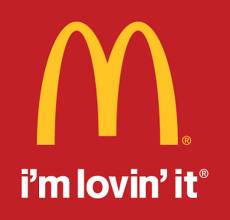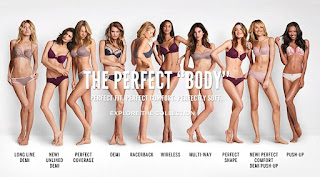The target audience would be the Mainstreamers from Young and Rubicams 4Cs model. This is because the brand is very well known and it is aimed at everyone. The Starmix sweets are easily recognisable and the advert is taking a relatable situation and incorporating their brand and products into it.
2. One company that uses a slogan is McDonald's. Their slogan 'I'm lovin' it' was first launched in 2003 and has been used ever since. The slogan consists of three words only which makes it easy for everyone to remember. Instead of promoting and promising a healthy meal like a lot of other restaurants do, McDonald's is promising an enjoyable and tasty experience which is shown by the slang word 'lovin.' The use of this word also makes the brand more relatable to everyone, especially teenagers. This is because a lot of young people, as well as some older ones, often do not say the full word and will miss of the 'g' at the end. The word 'I' is a contraction of the personal pronoun 'I' and the word 'am.' The use of this contraction is also more relatable to the audience as most people prefer to use the contraction instead of the two separate words. The pronoun 'it' is referring to the products themselves. It is also up for interpretation as everyone orders something different from the restaurant therefore everyone's 'it' will be different.

3. One advert that includes shock tactics is the WWF Panda advert. The shock tactics used here are effective as they have made the audience think about their opinions about whats happening to animals. The advert consists of many bluefin tuna however one of then has a panda mask on and the biggest text of the screen reads 'Would you care more if I was a panda?'. This is shocking as it is telling the audience that they should care about all animals equally and we shouldn't care more about the lives of the ones that are cuter and/or are more common. WWF have taken an animal that many people love and incorporated it in with an advert about bluefin tuna which people don't care as much about. This makes the audiences see the two creatures as equal and want them to help the tuna as much as they want to help pandas. It is also shocking as it makes the audience more aware of what is going on in the world and what animals are endangered.
The use of the pronoun 'you' gives a direct address to the reader which will make them feel shocked and guilty that they are not helping. This will make them more likely to contribute to the cause. There is more text at the bottom that includes more details about the tuna and how they are becoming extinct however it is in a really small font to make the reader focus more on the main issue which is that all animals are important and need your help to stop them becoming extinct.
4. This advert for Victoria's Secret uses the stereotype that women should look like supermodels. This advert uses an image of ten women that are all slim and tall and there is text that reads 'The Perfect "Body"'. This promotes the idea that women should all look like these women when the reality is, most women don't. The negotiated reading of this may be that the quote marks around 'body' mean that the brand does not think that women should look like this however they have used it to show that many people think they should. The advert is not necessarily suggesting that all women should look like this however it is suggesting that that body type is 'perfect' and that is who they imagine wearing their products. This could make women who don't look like this not want to buy their brand as they do not feel it is aimed at them.
5. This advertisement uses intertextuality as it is an advert for Halifax bank and they are using Fred and Wilma from the 1960s TV show 'The Flintstones.' They have used this as the majority of people who have a bank account are adults and many of these will remember the show from either its original run or from reruns. This will then add a sense of nostalgia to those customers. As well as this, 'The Flintstones' is that well-known that even younger people who have never watched it will still be aware of it's existence.
Another intertextual reference is shown in the advert as it is mixing a cartoon with reality. This mix of animation and real life makes the advert more interesting to watch therefore the audience will engage themselves more in it.
6. This advert for Smart Water includes the use of elite person Jennifer Aniston. Jennifer Aniston is well-known by everyone due to her role in 'Friends' and various other media texts she has been involved in. She is used in this advert because of her status and because she is loved by everyone. Also, she is used because she is in her 40s however she looks so much younger. This makes the audience think that if they drink Smart Water just like Jennifer Aniston, then they will look like her and look good for their age. Because Jennifer is a very well-know actress, people will want to buy the same water that she does so that they can be like her. Jennifer Aniston drinks this water and she is the best therefore Smart Water is the best.
7. This advert for Whiskas cat food offers reward and punishment to the audience. The advert tells us how the food contains all the 'essential vitamins and minerals growing cats need to keep them discovering new things on their own.' This is rewarding the audience by telling them that if they give their kittens this food then you are being a good owner but it is punishing them by telling them that if they don't, they are bad owners, Also, the advert ends with 'my cat loves Whiskas, and I love my cat.' This is telling the audience that if they love their cats, they should feed them this food and if they do not feed them this food then they obviously do not love their cats.
This advert not only punishes the audience by telling them they are bad owners, it also offers them the opportunity to become better owners by buying them the food their kittens 'need.'



No comments:
Post a Comment
What do you think?
Note: only a member of this blog may post a comment.